Vacaville man is blind, homeless and schizophrenic. Why can’t California help him?
“I think that’s him,” Linda Privatte says as we creep down Monte Vista Avenue, looking in all the usual spots for her younger brother, James Mark Rippee, who has been living on the streets right around the Solano County Building here for 15 years now.
It is Mark, kneeling beside the 7-Eleven, feeling around on the sidewalk for the debit card he keeps losing. One of the day laborers waiting in the parking lot next door thinks that we must be from the county and comes over to offer his own assessment: “Are you doing an evaluation? He decided to be this way. He decided.”
A lot of us tell ourselves that as we walk on by, annoyed and alarmed, not without reason, that the number of people yelling f-bombs into traffic as they push their carts around and around just keeps growing.
But no, Mark did not decide to lose his sight, along with part of his frontal lobe, in a 1987 motorcycle accident on his way back from a Father’s Day barbecue when he was 24. He did not decide to start hearing voices in the years that followed. He never chose to sleep in bushes instead of a bed after those voices convinced him to tear apart his garage apartment at Linda’s home; it’s just that the walls were talking to him, and he wanted to shut them up.

He never set out to burn down two different trailers in her backyard, either, though he did start those fires. And his longstanding “decision” to refuse all psychiatric treatment has been a symptom of his schizophrenia, too.
Opinion
Yet the system, if you can call it that, has done everything to protect that decision, and nothing to protect Mark.
As a result of that disconnect, we aren’t failing only him, but thousands of unhoused individuals across California. As is too often the case, his survival has depended on the stubborn heroism of his family, in particular his 65-year-old twin sisters. But his predicament shows that even with the strongest possible advocates, in a state willing to spend billions on this challenge, you can still be left to die on the streets. And most of all, what his story illustrates is why the “simple” solutions touted by politicians over the decades have so far solved nothing at all.
Before Mark’s accident, he worked in construction and loved playing the guitar. More than anything else, he looked forward to getting married and raising a family in his Northern California hometown, where the population is just under 100,000 and, as of a year ago, had just under 100 homeless people.

For the first 20 years after the night a car swerved into his lane on an S-curve, forcing him off a country road into an abandoned grain harvester, his family was able to care for him. Even with in-home help, this was an all-consuming effort for seven people, Linda says. “It took Cathy” — that’s Catherine Rippee-Hanson, Linda’s twin — “me, Mom, my father when he was alive, a full-time county caregiver living with him,” plus Linda’s husband and later, Catherine’s son.
After the fires that Mark admitted were no accident, Linda still let him stay with her, because how could she turn out her own brother, the baby of the four siblings? “But different things kept happening, and I could tell that it was scaring my children and making them anxious.” Then he got his own place, and then another and another, finally losing the last one the day he threatened to kill their mother with an ax, thinking she was an impostor who had come to hurt him.
“We called the authorities, and he went out on the porch and started a fire,” Linda says. “He lost my mom as his caregiver. He lost his housing voucher that day, and he got evicted. That’s the day he became homeless” back in 2007.
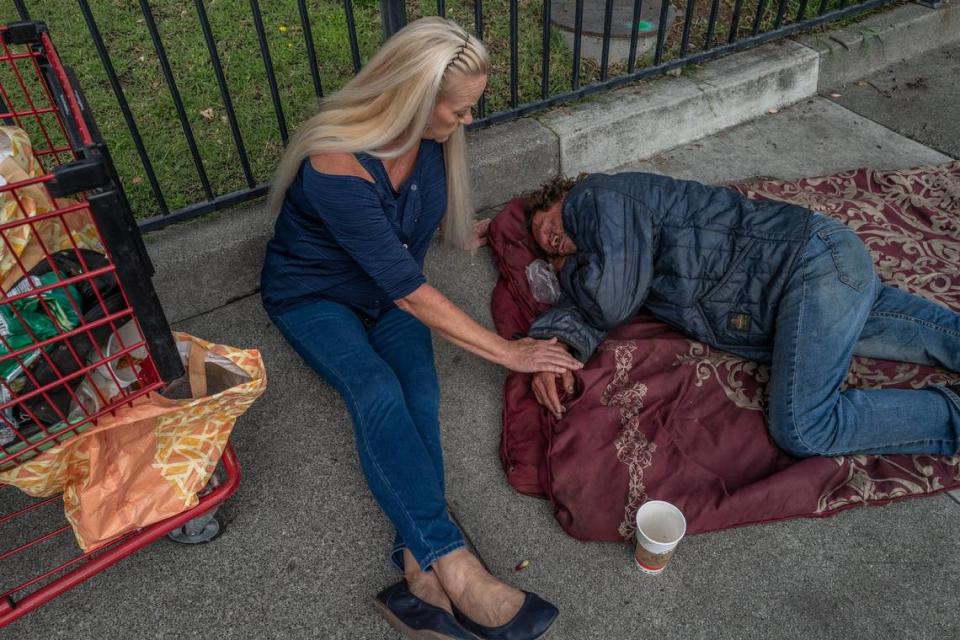
Robbed on the streets of Vacaville
This morning, the morning I first meet Mark, who is 59 now — “as mankind measures time,” he tells me — Linda has brought him another new sleeping bag, plus bacon, eggs, sausage and a thermos of coffee the way he likes it, with half a cup of sugar. But first, he must finish his morning routine. This involves swallowing a huge mouthful of salt — “I need sodium” — and rubbing his face raw with a toothbrush. Then he pours a bottle of water over his head and his shirt, which is dotted with cigarette burns.
Mark is not alone on the street, and his friend Teresa, who lives out here, too, shouts hello as we sit down in a shady spot to talk. Maybe to control what she can control, she’s sweeping the small strip of sidewalk in front of her with a broom.
Other people Mark knows on this block beat and rob him on a regular basis, though, and when that happens, he says, he fights back as viciously as possible, because he wants to survive. Dangerous as his situation is, he believes that if he leaves this area right around the county building, he’ll lose the protection of the “force field” around it and will die.
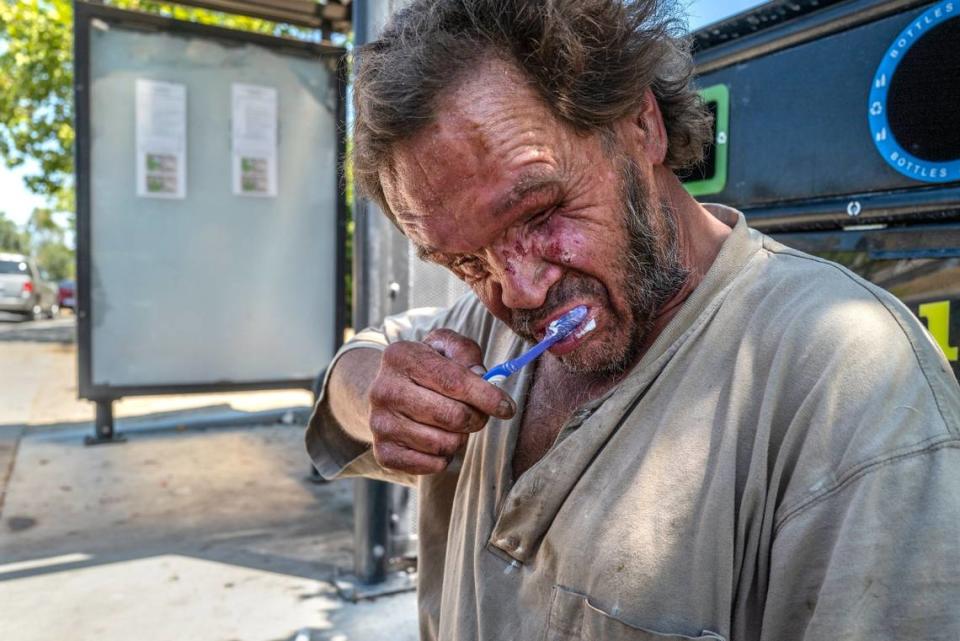
It’s beyond ironic, Linda says, that “he always comes right back to the county building — back to the people who won’t help him.” Or can’t. Over time, she’s decided that it isn’t really cruelty, or even indifference, that keeps them from doing so.
“At first I was angry with the police, and then I figured out that they’re only following the laws, right? And then I was angry with the city, because my God, this is his hometown, where he has lived his whole life, and how can they go past him every day and not try to do something?” Now, she says, she believes that it’s laws that have to change.
Meanwhile, authorities “don’t even go to Mark when we call. They just say we know who he is, and he has the right to refuse any services.”
His sisters worry more all the time that it’s his “right to refuse” that will kill him. “We’re all getting older,” Linda says. “Nothing is happening, he’s getting worse, he still hasn’t been treated. He’s dying out on the streets in front of everybody.”
The many protectors of her brother’s civil rights are adamant that he should get to choose whether to be treated for his severe mental illness, says his sister Catherine, in an interview later at her place, where she’s long been homebound by blood cancer. But as the result of his illness, he effectively “has no free will.”
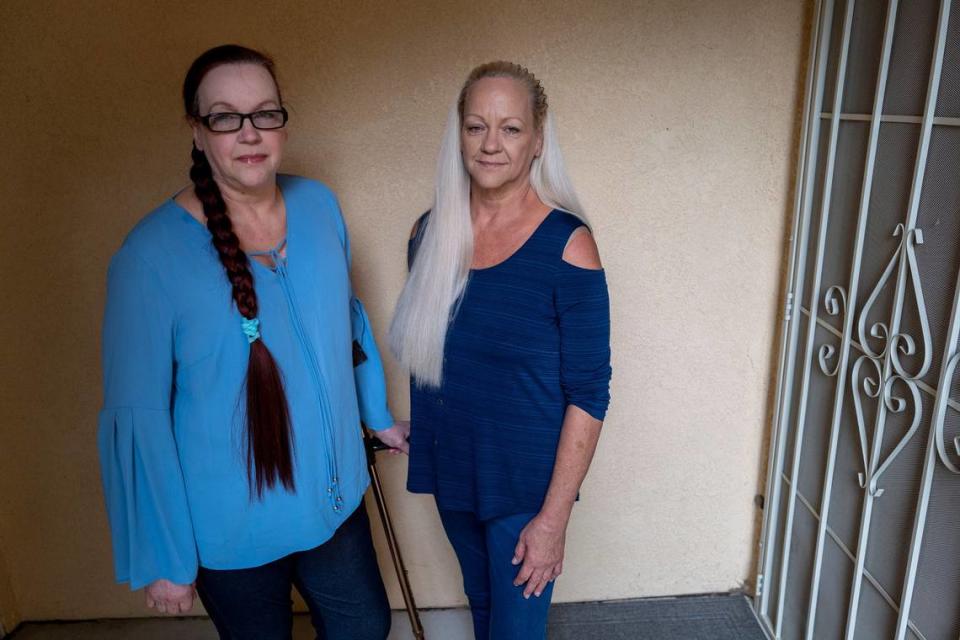
Linda finds it harder and harder to get out to see him. Because she’s lost sight in one eye and has no depth perception in the other, she has never been able to drive. And many of those who used to bring her to Mark have either moved away or dropped out of her life. “Some people who took me weren’t prepared for what they were going to see.”
Now, after not getting out here for a few weeks, Linda has lots of questions for her brother, like “what happened to your face?” and, “someone said you were asleep in the middle of the road?”
He’s too agitated to answer, at first motioning as if reeling in a fish, and then as if punching a ghost. “I’m not a game, sir!” he yells at no one, and later explains that the voices are being broadcast from a military submarine. Using “mind warfare” that has turned “almost every single person in my life against me,” the guilty parties are, Mark believes, doing all kinds of experiments on homeless people.
Linda has seen him in worse shape: “Some days he’s so depressed he doesn’t talk.”
But she’s also seen him a lot better, and not that long ago. He was hit by a car in February of 2021, and after refusing treatment for those injuries, he fell and broke his hip during a rainstorm. Even then, he refused medical treatment for 25 more days. But during the long hospitalization that finally followed, he was put on anti-psychotic drugs for the first time in his life, other than during 72-hour psychiatric holds years earlier.
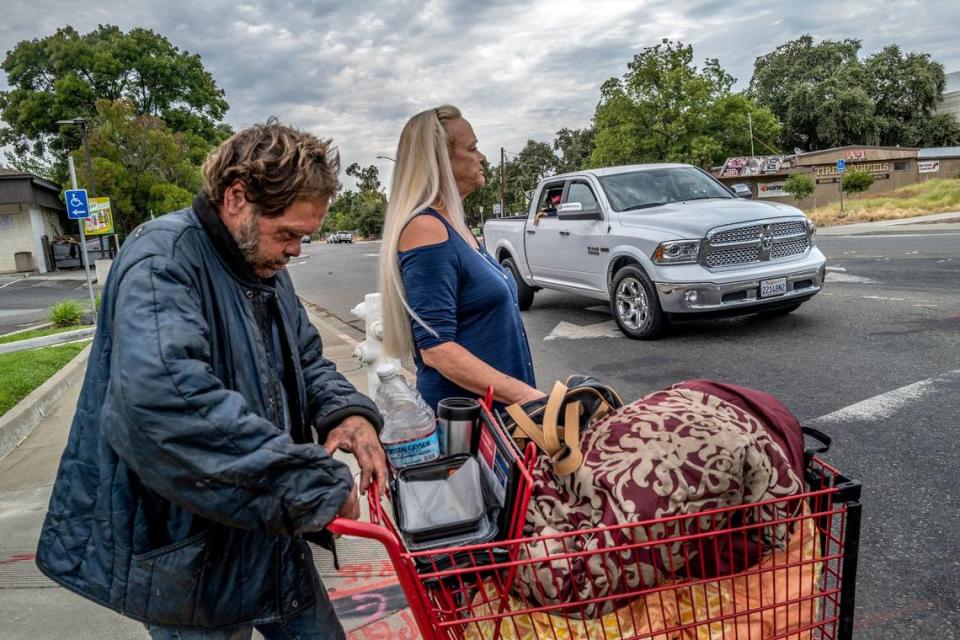
“The 8½ months he was in there,” Linda says, “we were thinking this is it, they’re going to see that this is what he needs. Look at him, he’s clean, he’s healthy, he put on weight, we’re talking to him normal.”
But as soon as he was well enough, “they just brought him back in a van, took him out in front of here and dropped him off” in the parking lot of the county building.
Before his sister leaves him, he asks her to bend down, hold both of his hands and help him “unplay” several years worth of the messages he’s been sent from the submarine. “You’re saving my life right now, sis,” he tells her.
If he isn’t ‘gravely disabled,’ who is?
It makes no sense that a man as ill as Mark is still stumbling around on his own. So why is he?
Teresa Pasquini, a Contra Costa County activist whose son is severely mentally ill, is well acquainted with both Mark’s situation and treatment in California. And as she sees it, Mark has essentially been “locked out” by gaps that make it absurdly hard for some of those most in need of help to get it.
In his case, that’s because as someone whose initial diagnosis was a traumatic brain injury, he supposedly doesn’t qualify for help for his severe mental illness on a medical basis. (Yes, though mental illness is a medical condition.) And in Solano County, he doesn’t qualify for a conservatorship based on his mental illness, either.
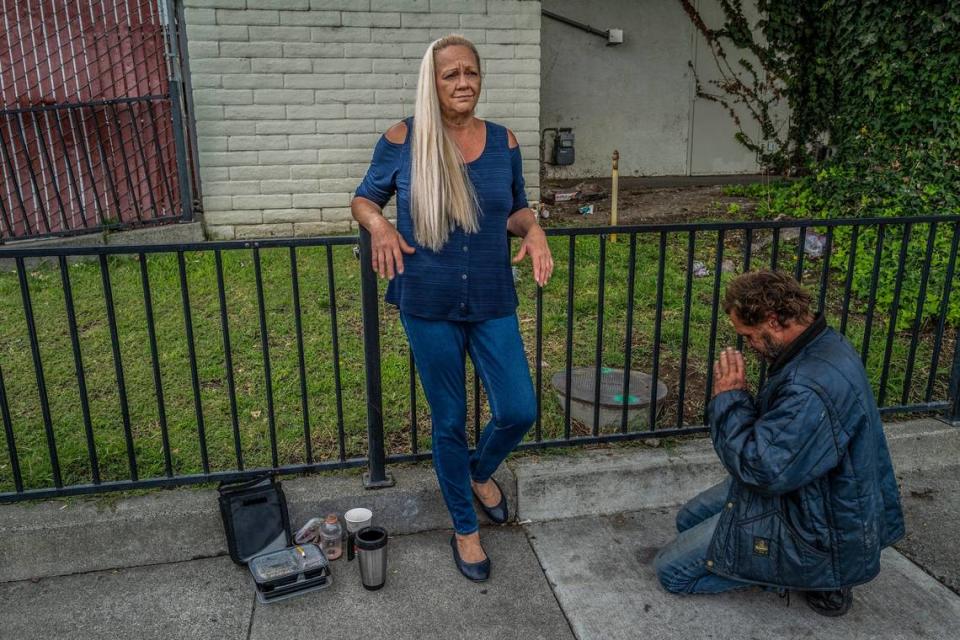
Say what? There are two types of conservatorships in California. The probate conservatorship, which is what Britney Spears had, is more typically for someone with dementia, or some other incapacitating medical problem, who needs help taking care of himself. Those under probate conservatorships can’t be put in a locked facility against their will. Because Mark’s traumatic brain injury and blindness are considered his primary diagnoses, you’d think he’d qualify on that basis, but because he’s also severely mentally ill, he does not.
An LPS conservatorship — named after Frank Lanterman, Nicholas Petris and Alan Short, the three lawmakers whose 1967 bill ended most involuntary commitment of the mentally ill — is for someone who is so severely mentally ill that he is either a danger to himself or others, or else is “gravely disabled.” People under this type of conservatorship can be forced into treatment.
Yet though Mark is certainly a danger to himself, because he accidentally wanders into traffic on a regular basis, and is also what you and I would consider “gravely disabled,” he somehow doesn’t qualify for that, either.

That’s because each of California’s 58 counties interprets “gravely disabled” — incapable of taking care of one’s food, clothing and housing needs — a little differently. In Solano County, a man whose clothing is covered with cigarette burns, who can’t keep housing and pushes around a cart full of rotten food is somehow seen as insufficiently compromised.
In 2019-20, according to the Department of Health Care Services, 1,459 people were on temporary LPS conservatorships in the whole state, and 3,672 on permanent ones.
In an email, Solano County Supervisor Skip Thompson’s office explained to Mark’s sisters that he could not be conserved because whenever he’s on even a brief involuntary hold, he improves so much that he must be released under the law: “This is not a situation that we have ignored, nor that we condone,” the email said. “Simply the law requires stringent standards to impose conservatorships — standards that so far we cannot meet.”
“Laura’s Law,” which provides court-ordered treatment in the community for a small number of severely mentally ill people, doesn’t apply to people with traumatic brain injuries.
Solano County officials ‘do feel for him’
Solano County’s director of Health and Social Services, Gerald Huber, tells me that though Mark “may not look like it, he does have the ability to make some decisions for himself,” and that has so far made it impossible for him to get the long-term residential treatment he needs. Which, Huber adds, wouldn’t be available anyway because even the prospect of funding something like that “is pretty bleak for small counties like ours.”
“Everybody knows Mark quite well,” Huber says, and “we do feel for him. If I hear he’s in a hospital locally, that’s when I know he’s the safest.” But then he gets well, has to be released, and quickly declines all over again. And even worse, “every county has a Mark. Every county has multiple Marks.”
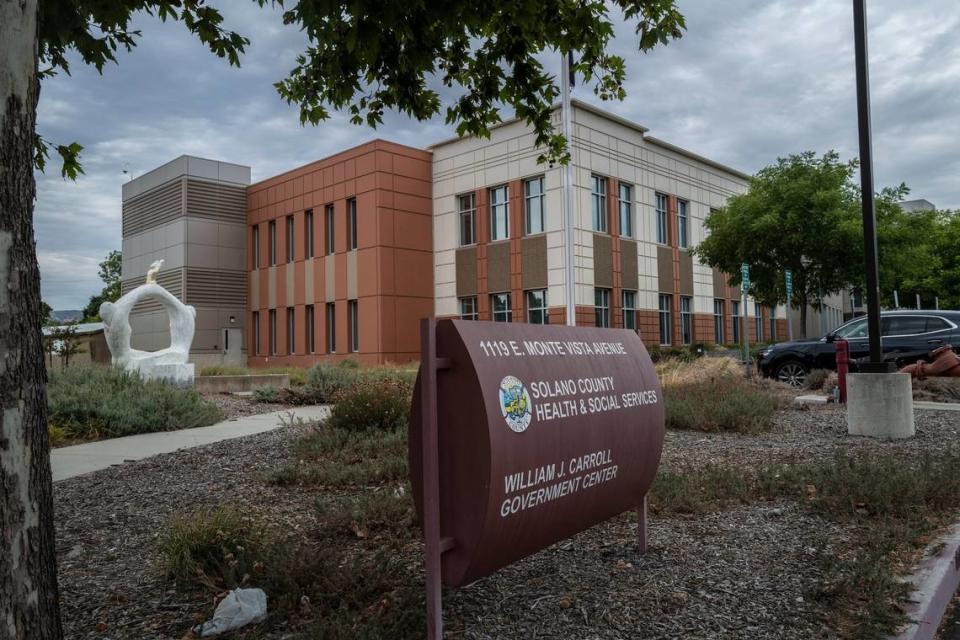
Vacaville City Councilman Nolan Sullivan, who in his day job is director of Yolo County’s Health & Human Services Agency, tells me that “it’s hard when folks have a TBI that leads to a mental decline.” But no one can say for sure that Mark would not have developed schizophrenia even if he hadn’t had that accident, right?
True, Sullivan says. “But from what has been represented to me, Mark has declined service, and that makes it almost impossible to serve him. I’ve wracked my brain. There have been dozens, if not hundreds of attempts to help him.”
Yet his sisters insist that he hasn’t had a proper psychiatric assessment in years, even when he was in the hospital. After they complained that he’d been arrested for nuisance crimes almost 100 times, police stopped doing that, but also stopped responding to reports of psychotic episodes, so that now, according to Linda and Catherine, he isn’t getting assessed for even a temporary psychiatric hold, much less a conservatorship.
‘They say it helps keep the voices down’
What a surprise, then, when on another visit with Mark, I happen to arrive just as a psychiatric physician’s assistant for the county is giving him his first long-acting shot of Seroquel, an antipsychotic drug used to treat schizophrenia. He screams for just a second as the physician’s assistant, Jaron West, does this, but Mark did agree to it, he says, because “they say it helps keep the voices down.”
“We’ve been trying to help him for some time,” West tells me, “but the county doesn’t have any resources.”

His sisters are incredulous that he was even briefly lucid enough to say “yes” to a shot. Mark doesn’t think it will help, because “the sounds come from outside the ears.” Still, he’s very interested in the other thing that I heard West tell him, which was, “I’ll talk to Officer Potter’’ — Sgt. Aaron Potter, who heads the Vacaville Police Department’s Community Response Unit — “about that housing lottery.”
That’s a major incentive, because as Mark sees it, “what I need instead of a bunch of blankets is rent to get into a place.” He does need that, and in fact is worse off than when last we met, because he’s recently been roughed up and rolled again, relieved even of his cane, and so is using a broken off broom handle to help him navigate.
But without a lot more than drive-by treatment, it’s hard to see how Mark could possibly get and keep housing.
It isn’t that he doesn’t know about or believe in mental illness. At one point, he even suggests that he’s actually a little worried about his sisters on that front: Linda “and my sister Cathy have some kind of phobia; they always think they’re sick.”
He just doesn’t think there’s anything wrong with him that wouldn’t be remedied by an apartment and the extermination of the extraterrestrials who are tormenting him.
He describes his life as one perpetual “mind rape, just as bad as a woman getting brutally raped. I want privacy in the most intimate areas of my brain.”
Yet, like all of us, Mark is also more than his problems, and he tells me several times that he still wants love: “I got desire, too. It has to have meaning. It can’t be just any girl.”
As he walks away that day, toward the bus stop where he can sit but can’t board because the drivers have run him off so many times, his friend Jackie Burnside stops to tell me what a good friend he is. “I’m homeless, too,” she says, as the result of domestic violence and other experiences that inspired the hand-drawn tattoo on her arm: “Property of Jackie Only.”
Mark “gets mad sometimes and yells,” she says, “but he’s a good-hearted person. When I’m hungry, he buys me food. Don’t get on his bad side, but we’ve been there for each other,” often sleeping near one another beside the tire shop, “just as friends,” for mutual protection.

CARE Court could open treatment options
People like Mark are the reason that Gov. Gavin Newsom and others are pushing so hard for the CARE Courts that would temporarily mandate treatment for those too sick to know they need help.
Thirty-four miles northeast of Vacaville, in Sacramento, we have many such severely ill people, too, of course. Elizabeth Kaino Hopper, of Carmichael, has a 33-year-old daughter who has been homeless on and off since her mental illness swamped her ability to agree to treatment. Those still capable of agreeing to treatment are the ones writing to the ACLU, she says, while “people whose illnesses are harder to treat are the voices we don’t hear.”
Since April of this year, though, her daughter has been much better, because since her arrest for assault with a deadly weapon — “trying to protect herself on the street” — she’s been living on the third floor of the Sacramento County Jail.
Three months earlier, a clinical social worker had assessed her daughter and found her “gravely disabled.” But when Sacramento County dispatched a fire truck — yes, a fire truck — and sheriff’s deputy to transport her, those officers said, “No, she knows her name, knows what day it is, has a box to live in and a dumpster to live out of — that’s food and housing” so she was not considered gravely disabled after all.
As a result, Hopper was reduced to hoping that her daughter would commit a crime that hurt no one and yet was serious enough to “win the golden ticket to get to the jail,” where she’d finally be treated, monitored and often reassessed, none of which was happening otherwise.
So yes, Hopper is a big supporter of the CARE Court idea, despite enormous pushback.
Critics argue that forcing people into treatment would be counterproductive, a horrible civil rights violation and, what’s more, under-funded. (That last objection reminds me of the old Woody Allen joke about two friends complaining about the meals at a Catskills resort. “Boy, the food at this place is really terrible,” says one, to which the other replies, “I know, and such small portions.”)
No one thinks such courts would constitute any kind of cure-all. But as Vacaville’s Nolan Sullivan says, it would at least open up “some new pathways” for helping in situations where right now, “localities are powerless” to intervene.
More treatment would have to be made available, too, it’s true. Because right now, Pasquini asks, “where do you place somebody who is blind, has a traumatic brain injury and the symptoms of schizophrenia? That’s the million-dollar question. You can’t find a bed for a person with schizophrenia, let alone all those other things.”

Sullivan says that’s because providers have no choice but to play a numbers game: “For every Mark, you’ve got 100 people in opioid addiction, so how do you triage?”
But there is at least a corner of hope that long-acting monthly injections, if Mark continues to accept them, could calm the voices that torment him enough to make other interventions possible.
Kate Grammy, the Behavioral Health Services Administrator for Solano County, says that a small homeless outreach team that’s been operating for several years is, as of April of this year, working with a mobile crisis team. It’s part of a pilot program that’s shown a lot of promise elsewhere in the state. That’s the team that gave Mark his first shot.
“I’m ecstatic with what I’m seeing,” from the new mobile crisis teams, says Catherine Moy, a city councilwoman in Fairfield, Solano’s county seat, where she ran a shelter for many years. “We piloted that program here,” starting about two years ago, “and one gentleman who had lived on the streets for years,” and became violent on a regular basis, has now been on medication for seven months, “and he no longer has that situation. It takes a long time, and it’s expensive, but I’ve seen it work, and we owe it to them.”
It’s also expensive to go on as we have been, watching people die.

Grammy acknowledges that staffing for mobile crisis teams is an issue, here and everywhere. But persistence in offering services makes a difference, which is why some people who’ve long said no to services are agreeing to work with these teams.
Even if those teams expand, laws and attitudes will have to change, too, if we’re really going to reach those hardest to treat.
The definition of “gravely disabled” should certainly be expanded to take account of anosognosia, a condition associated with schizophrenia, Alzheimer’s disease and other medical problems, which prevents people from understanding that they need treatment.
And state Sen. Henry Stern’s important bill guaranteeing a right to treatment for unhoused and severely mentally ill Californians ought to be paired with the CARE Court bill, because what does mandated treatment mean if none is available?
‘Our family is his mental health system’
After Mark got that first shot of Seroquel, his sisters were briefly ebullient. But then, only two days later, they got a bunch of calls reporting that he was walking on a freeway ramp straight into traffic.
Mary Borchers, who was driving on I-80 toward Vacaville that day, tells me, “I saw a big rig slam on his brakes” on the exit, “and then I saw Mark, and holy crap, someone’s going to fricking run into him!” She called 911, was told that several others had already reported the same thing, and that California Highway Patrol officers were on their way.
By the time she was able to circle back around to see if he was OK, he was with law enforcement who then “left him to fend for himself once again.”
The morning Linda next sees Mark, he’s still asleep on the sidewalk and for many minutes too groggy to talk. One homeless man walking by taunts him — show these ladies your Super Bowl rings why don’t you — and another asks Linda why she can’t take Mark home with her.
On this day, Mark urinates into a cup right in front of us, and never does come around enough to answer her questions about the Seroquel, which most likely won’t kick in for weeks.

He is able to explain walking onto the freeway, though: He and a friend had been out looking for an apartment, and after that friend disappeared, he somehow got turned around and walked into harm’s way: “I was trying to get us off the street!”
But then suddenly he’s channeling the voices he’s hearing, shouting, “Mark, goddamn you!” and “I turned the controls over to James Mark Rippee!” He is the voices, and how scary would that be?
As we walk away, Linda is crying a little. She always feels guilty leaving him, she says, because “it makes me feel like I’m as bad as our U.S. mental health system.”
That isn’t true, but this is: “Our family is his mental health system.’’ Until laws change, it’s the only one he’s got.
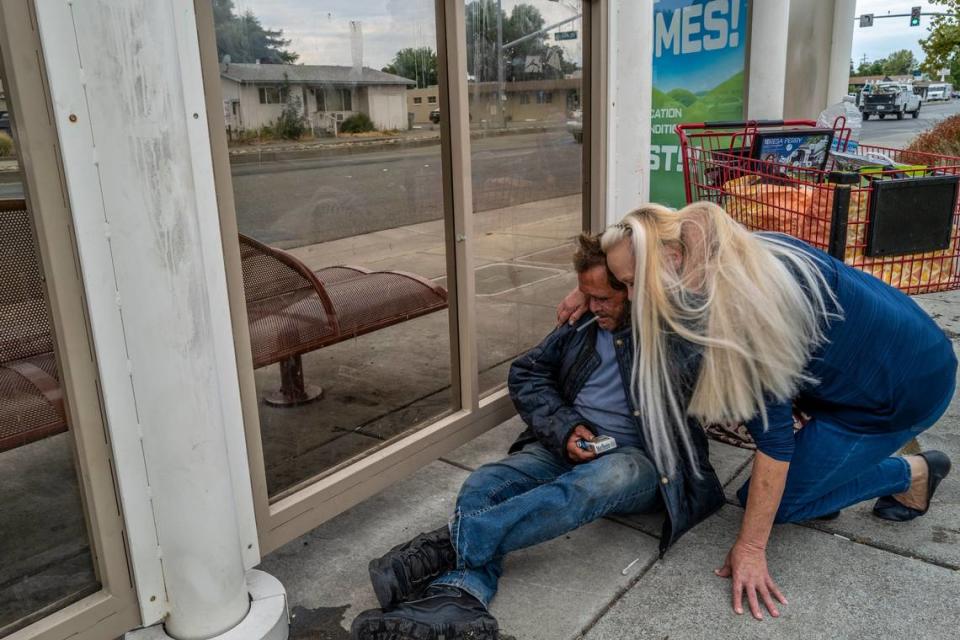

 Yahoo Movies
Yahoo Movies 
